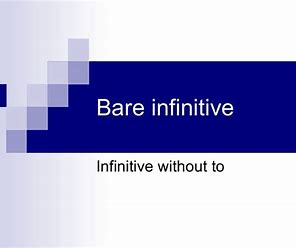Infinitives
In the previous blog, we learned about infinitives. In this blog as well, we are going to continue the same topic in much more detail.
Types of Infinitives
1) Bare Infinitives
2) Full Infinitives
3) Split Infinitives
Now let's learn about each infinitive in detail.
1) Bare Infinitives
a) What is a Bare Infinitive?
A Bare Infinitive is a type of infinitive, in which the word 'to' is not used. It is written without it.
A Bare Infinitive is immediately followed by an auxiliary verb, such as - will, must.
Example:
a) I must come with you.
In this sentence, the word 'must' is an auxiliary verb and it has followed the word 'I'. Hence, it is a bare infinitive.
b) She will meet you tomorrow morning.
In this sentence, the word 'will' is a modal auxiliary verb and it has followed the word 'She'. Hence, it is a bare infinitive.
c) We must go.
In this sentence, the word 'must' is an auxiliary verb and it has followed the word 'We'. Hence, it is a bare infinitive.
Now let's learn about the next type of infinitive.
2) Full Infinitive
a) What is a Full Infinitive?
A Full Infinitive is a type of infinitive that is used after a describing word (adjective) to give a reason or an opinion (advice).
Example:
a) Sam works hard to earn money.
In this sentence, the word 'to' is used to give a reason why something is done.
In this case, it is used to show why sam is working (in order to earn money).
b) She made the food to enjoy today's feast.
In this sentence, the word 'to' is used to explain why she made the food.
In this case, she made food, in order to, enjoy the feast.
c) They took a taxi to reach the theatre on time.
In this sentence, the word 'to' is used to show the reason why they took the taxi (in order to reach the theatre on time).
Now let's learn about Split Infinitive in detail.
3) Split Infinitive
a) What is a Split Infinitive?
A Split Infinitive is a type of infinitive an adverbial phrase is inserted between the 'to' and the basic verb form.
Example:
a) Mike was too busy.
In this sentence, there is an adverb that is placed - 'too' that is used to show the adverb of degree. Hence, it is a Split Infinitive.
b) He was going to immediately call the doctor.
In this sentence, the word 'to' is placed between an adverb. Hence, it is a Split Infinitive.
c) He was too young to participate.
In this sentence, the word 'too' is used to show the adverb of degree. Hence, it is a Split Infinitive.




Comments
Post a Comment